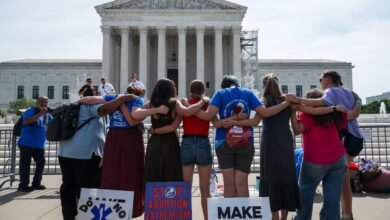Is the partisan divide too great to overcome?

Bernard Clay, a middle-aged black data analyst and poet from Louisville, Kentucky, was suspicious when he was paired with Shaelyn Bishop, a shy, young white biologist who grew up on a family farm in rural Green County, Ky. ., 15 minutes from the nearest city.
But during a structured brainstorming session in 2022 during a weekend retreat with the Kentucky Rural-Urban Exchange, something clicked. Clay, 47, had a side project chronicling Kentucky’s Black Civil War veterans. Bishop, 34, during quiet hours alone studying the ecology of Clay Hill Memorial Forest in Taylor County, Kentucky, pondered the old stones that almost certainly marked the burial sites of those once enslaved, a forgotten memorial to a hidden man. past.
An effort was born — the Enslaved People of Clay Hill, or EPOCH, Legacy Project — to officially recognize the cemetery. And a connection was made across chasms of race, age and geography.
The country’s poisonous divisions, exacerbated by politicians, cable news and the media, and collectively known as the industrial complex outrage, have been much lamented. Less noticed is the Counterbalance, a constellation of nonprofits and other organizations like the Kentucky Rural Urban Exchange dedicated to bridging divides – urban and rural, black and white, LGBTQ and straight, left and right. Call it the kumbaya industrial complex.
The problem: The sharpest divide — Trump-brand conservatism versus the rising political left — may be one in which no one is interested in reconciliation.
“We have to focus on what we call the exhausted majority — that is, 65 percent of Americans,” said Stephen B. Heintz, president and chief executive of the Rockefeller Brothers Fund, a major funder of the proliferating groups trying to advance the community. floor. “It is simply not an efficient use of time to convince true ideologues to compromise.”
On June 17, with support from the Rockefeller Brothers, the MacArthur Foundation, the Emerson Collective and others, a new group, Trust for Civic Life, will award its first $8 million to 20 civic groups considered the most promising in their efforts to rebuild the community. and reinforce democratic values. Another $2 million will come later in the year to fulfill the fund’s promise of $10 million a year for community-level democracy efforts. In this case, “democracy” comes with a lowercase “d” – emphasizing efforts to reinforce the values needed to promote democratic pluralism, without explicit mention of Republicans or Democrats.
The first trust grants, selected from more than 60 organizations, will be announced in Boulder, Colorado, at a Democracy Financiers Strategic Summit on combating authoritarianism, further proof that building bridges has become the hot new concept in a country that look for hope.
In Minnesota, a fledgling Rural-Urban Exchange, inspired by the Kentucky model, is taking root. Braver Angels, a national organization, explicitly seeks to promote dialogue and respect across political divides. The Lyceum Movement, recalling early 19th century efforts to form communities in a new nation, is convening meetings and lectures in cities large and small in Iowa, Michigan and Minnesota, attempting to replace local institutions such as churches, newspapers and services. societies that atrophied, replaced by national tribalism.
NewGround is expanding from its Los Angeles base to train facilitators to promote dialogue between Muslims and Jews at one of the most difficult times in the history of the Israeli-Palestinian conflict. And at colleges and universities divided by fierce partisanship, BridgeUSA has established 65 chapters, hoping to make those who embrace dialogue the true campus radicals, not those who align themselves with the left or right, said Manu Meel, director -executive of the organization. .
“If you are a student, you need to feel that the way to gain credibility is by being a bridge builder, not a conflict entrepreneur,” Meel said.
Scaling up such efforts to make a notable difference, especially in political discourse, can seem like a pipe dream when forces as large as Fox News, MSNBC, TikTok and YouTube — not to mention the tone of the country’s leadership — pressure the leadership. opposite. Organizers have faced difficulties whenever a dominant political power has no interest in coming together in the middle.
For the BridgeUSA chapter at the University of California, Berkeley, that dominant power is the left. The organization began in Berkeley in 2017, after an attempted visit by alt-right provocateur Milo Yiannopoulos incited violent clashes. Now, said Lucy Cox, a rising 20-year-old from Berkeley and president of the school’s chapter, the gap in the group’s reach comes from the left. BridgeBerkeley’s debates, discussions, and social gatherings attract groups of conservative students.
“But we haven’t had any luck getting Cal Dems or the Young Democratic Socialists of America” — Berkeley’s biggest political groups — “to any of these events,” she admitted.
These groups consider even listening to Trump-aligned conservatives to be a “platform” for evil, Cox added.
“I wish there were more people willing to listen to everyone,” she said. “I think it’s possible, but there are groups on campus that are inaccessible right now.”
At the University of Colorado in progressive Boulder, the BridgeUSA chapter is encountering the opposite problem: Conservatives won’t show up, said Abigail Schaller, 21, the chapter’s president. She hopes to have Republican speakers on campus next school year to reassure that side of the divide that speech can be empowering.
“This is a problem 50 years in the making,” said Heintz, chief executive of the Rockefeller Brothers, “and it’s not going to be solved overnight.”
Even with limitations, those involved say the effort is worth it, even if it’s just for their own sanity.
“Relationships are the root and the flower. They are the point where social infrastructure creates infrastructure for anything to happen,” said Savannah Barrett, who co-founded the Kentucky Rural-Urban Exchange in 2014, adding, “When you look for common ground, you find it, but the conversation is impossible. be about conversion.”
Every year since then, a group of about 60 people, drawn from across the state and selected from the widest possible range of perspectives, has met over two three-day weekends, one in a city, the other in a rural area, with an optional weekend to follow.
A weekend in Campbellsville, Kentucky, in May highlighted the promise of the effort — and its shortcomings. There was no denying the eclectic nature of the group: Jody Dahmer, the gay urban gardener running for Louisville City Council; Belle Townsend, the small-town queer poet fresh out of college; Mohammad Ahmad, the young practicing Muslim and Palestinian-American from a Cincinnati suburb; Darryl “Dee” Parker, the black racial and social justice activist from Hazard, Kentucky; and LaToya Drake, the black woman from small-town Glasgow, Kentucky, wondering if her love for rural Kentucky was reciprocated.
What was missing from a self-selected group of would-be peacemakers were the ardent followers of former President Donald J. Trump, who dominate Kentucky politics and appear to have little interest in the outstretched hands of RUXers.
Bob Foshee, a 71-year-old retired educator from Louisville and resident curmudgeon of the 2024 cohort, produced a handwritten breakdown he compiled of the 2020 vote for Trump and President Biden in the counties surrounding Campbellsville University, which hosted the RUX weekend . Taylor County broke 75 percent for Trump and 24 percent for Biden. Green County broke 83-16. Casey County, 87-13.
Yet between discussions about an unacknowledged dark past, gratitude for the safety RUX provided Kentucky’s queer community, and methodical brainstorming sessions to encourage leadership and entrepreneurship, the politics that clearly weighed heavily on Mr.
“This program’s gentle approach doesn’t try to get to the core,” Foshee said.
For Townsend, 23, Campbellsville University has particular meaning. Max Wise, an alumnus and former professor at the university, is the city’s state senator and author of Kentucky’s sweeping anti-transgender law, passed last year. He tried this year to ban diversity, equity and inclusion programs in public schools, colleges and universities.
Yet his name was never mentioned during the weekend in Campbellsville.
Townsend, who is also a baker and former tracker for the Kentucky Democratic Party, can be fierce. Her hometown in western Kentucky, Robards, population 500, wasn’t exactly open to her feelings about gender and sexuality, she said.
Still, she didn’t lament the lack of conversation about the Kentucky Republican Party’s anti-LGBTQ policy
“It allows them to drive the narrative,” she said.
This seems to be a recurring issue in the bridge building movement.
On a Saturday afternoon in Michigan in late April, under the fluorescent lights of the Kalamazoo Public Library’s third-floor meeting room, about 40 West Michiganders, none of whom appeared to come from Michigan’s prominent far right, gathered for a Kalamazoo Lyceum reunion.
Lyceums began in the early 19th century to bring the brightest minds to small towns and rural classrooms, hoping to bring all citizens of America’s nascent democracy into the communal conversation. At the outbreak of the Civil War, some 3,000 high schools dotted the American landscape.
“The problem is real, but I don’t think lamenting is helpful,” said Nathan Beacom, the executive director of the movement’s reincarnation, who was in Kalamazoo that afternoon, lamenting how the profusion of little leagues in his country’s Des Moines had young people diminished to one when parents placed their children in paid traveling leagues, more concerned with performance on the football field than the community in the stands.
But, he added, “I don’t think the answer is to talk more about politics. I think it means talking less about politics.”
The meeting then broke into smaller groups to discuss community, belonging and community responsibility.
“For me, this is just a fun activity. I’d rather do that than play golf,” said Reid Williams, writer and editor for a new local nonprofit news outlet, NowKalamazoo.
Ben Tillinghast, a young law student at Notre Dame who came from South Bend, Indiana, where he attended high school, to experience Kalamazoo’s version, was realistic. A Lyceum meeting, he said, “is not the magic pill that will solve society’s problems.”
The problems of society, no, but the deficiencies of individuals, perhaps. For Ms. Bishop, the young woman who participated in the Kentucky Rural-Urban Exchange, work has been a source of personal strength. From the beginning of her partnership with Clay, she said she wondered if she would be the right person to try to shed light on a forgotten slave cemetery. But Mr. Clay was firm, she said, “Shaelyn, we can do this.”
He has pored over the archives of Sanders’ antebellum plantation, chronicling the names of the enslaved. The two recruited archaeologists for an initial examination of the cemetery. She is pushing to join the Clay Hill Memorial Forest board so they can carve out that little piece of forest preserve to be cleaned, marked and honored.
“I feel more comfortable alone in the woods than talking to people,” she admitted. “But that’s the power of RUX. It was life changing for me.”




